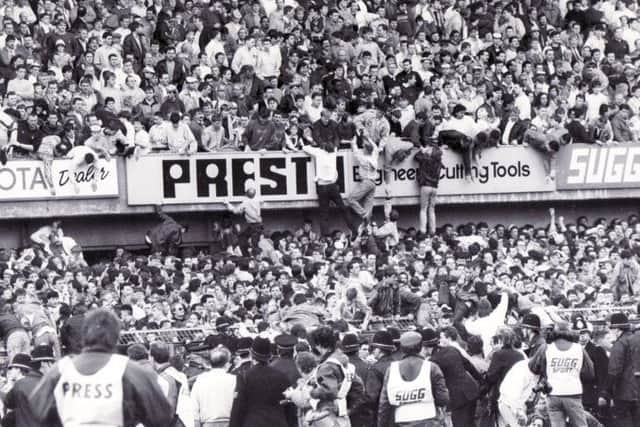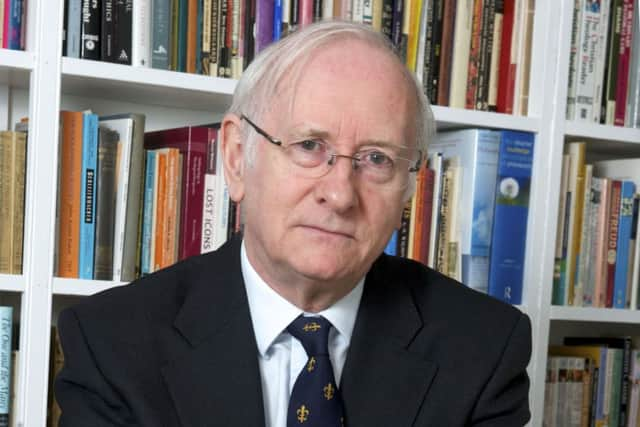Exclusive: Police’s legal bill for Hillsborough inquests hits £12 million


The scale of the financial burden has prompted fears money will have to be diverted from operational policing and South Yorkshire’s Police and Crime Commissioner (PCC) Dr Alan Billings is due to meet Home Secretary Theresa May on Tuesday in a bid to secure crucial extra government funding.
The PCC’s office has been trying for more than a year to get the Home Secretary to help fund the costs but has so far been unable to secure a firm commitment on how much will be made available.
Advertisement
Hide AdAdvertisement
Hide AdAs the inquests are set to run for another year, South Yorkshire Police may ultimately face a bill in excess of £20m - the equivalent of close to 10 per cent of the force’s entire annual budget.


The bulk of the cost relates to eight former senior officers, including former chief superintendent David Duckenfield, who are formally represented at the inquests in Warrington.
By the end of last November, two law firms representing the officers had received payments totalling just over £11.5m. In addition, South Yorkshire’s chief constable is also represented at the inquests, with the latest costs available showing a further £810,710 spent.
Dr Billings warned that without government support “the costs will present a serious threat to the Force’s financial stability and capacity to deliver normal policing services.”
Advertisement
Hide AdAdvertisement
Hide AdFormer Home Secretary David Blunkett, a Sheffield MP, said: “I share the deep concern that money should not be diverted from protecting the well-being of local people, which is why I have been in touch on several occasions with the Home Secretary and have now secured a meeting in the next few days with the Reverend Dr Alan Billings.”


Relations between the PCC and the Home Office have been strained to near breaking point over the multi-million pound legal bill.
The dispute over who should pay the costs stems back to last June when Home Secretary Theresa May warned then-South Yorkshire PCC Shaun Wright that any extra government money would be capped at the level of financial support provided to the Hillsborough families, whose costs are being met by the Home Office.
Correspondence obtained under the Freedom of Information Act reveals Mr Wright told Mrs May that he was effectively hamstrung from reducing payments to the law firms representing former officers because of the wording of the Home Office’s own directive on legal support.
Advertisement
Hide AdAdvertisement
Hide AdThe directive – Home Office Circular 43/2001 – advises legal costs for officers should be paid if they acted in good faith but provides no further guidance on what would constitute a reasonable limit.
A letter from the PCC to the Home Secretary on July 28 said: “I am effectively prevented from compelling the firms to comply with your newly imposed arrangements, by the terms of your circular.”
The letter added that the PCC had approached the two law firms – Lewis Hymanson Small and Burton Copeland – to try to get them to reduce costs but said they “have raised a number of concerns about the proposals, including arguments that seeking to alter arrangements now would breach an agreement already reached.”
An invitation by the PCC to involve the Home Office in negotiations with the law firms received short shrift.
Advertisement
Hide AdAdvertisement
Hide AdAn email from a Home Office official on August 14 said “… it is not for the Home Secretary to negotiate the proposals for the legal costs, as the decision is one for the PCC.
The email added: “The Home Secretary is prepared to pay the specified amount of Special Grant on the basis that the legal costs of the families and the ex-police officers are broadly comparable. The Home Secretary is concerned that there should be fairness between the two parties.”
A request from the PCC that the Home Secretary tightened guidance on legal costs was also brushed aside.
The official wrote: “We have noted the issues with the circular and we will look at whether this can be improved and/or updated. However, this will not happen in the near future, and will not be in place for the PCC to use in this case.”
Advertisement
Hide AdAdvertisement
Hide AdThe PCC’s office wrote back on September 15 reiterating it was proving very difficult to lower payments and again stated: “The difficulty is that your current proposals are inconsistent with your current circular.”
A Home Office official then issued a sharply worded response on October 3 which said: “It is for the Home Secretary to decide whether a Special Grant should be provided to the PCC, and if so how much funding will be made available.
“As you are aware, I have indicated in meetings that Special Grant is wholly discretionary - PCCs do not have a ‘right’ to additional funding from the Home Office as they are expected to manage their own finances within the budget that has been provided to them.
“It is of course open to the PCC to withdraw his application for a Special Grant if he believes that the conditions are unacceptable.”
Advertisement
Hide AdAdvertisement
Hide AdAn agreement still remains elusive ahead of Tuesday’s key meeting between the two parties.
Harry Harpham, chairman of the South Yorkshire Police and Crime Panel, which scrutinises the work of the PCC, said: “My understanding is that [the PCC’s office] followed the Home Office guidance and they didn’t really have much choice about it.
“The most important thing is that the families get justice and everything that happened comes out.
“I agree 100 per cent with the inquests and it has to be carried out but I do feel it is unfair that the tax-payers of South Yorkshire are going to suffer the consequences by having fewer police on the streets.
“That money has obviously got to be found from somewhere. It is unfair the ordinary citizens of South Yorkshire should get less of a police service because of the inquests.”